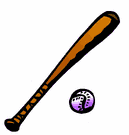|

Michael Schein
Farewell to Edgar
I shaved before going to the ballpark today
and dressed as if it were a party—or worse.
The Mariners are twenty-eight games out of first
and Ichiro has laid Sisler’s mark to rest,
yet this meaningless October contest
far transcends runs, hits and errors,
for today we say farewell to Edgar.
The sky is blue as any day in June
but the air too thin to hold any warmth;
though political banners trumpet autumn
the playoff bunting creates no illusions;
rather, in the susurrus of this somber crowd
voicing for the last time a mournful,
elongated “Eddddddd-garrrrrrrr” as its battlecry,
I sense only funereal resignation, a doleful
turning to the hard, familiar task of saying good-bye.
We know the ritual, it is written in the memory
of the luckiest man alive,
his words echoing in Yankee Stadium
longer than his heart survived.
It is written in the icon of the old veteran,
hamstrings plucked, eyes dulled, belly bloated,
reduced from home runs to speechifying,
an awful spectacle, as if Rilke or Auden
were suddenly handed a bat with the bases loaded.
This game for boys is no place for old men.
It is a sylvan game, played on the Elysian Fields
of Summer, Youth, and Myth,
without any parsing of the passing seconds.
There! up on the screen as through a looking glass
prances a lithe mustachioed Edgar,
fleet of foot, anonymous and devoid of fat,
with a triple in his first major league at bat.
He could have been anyone then, and was,
just the kid at the door on prom night
or the bag boy at the grocery;
nobody knew what lay in store:
300 homers, doubles galore, two batting titles,
The Double that slew the damn Yankees
and saved baseball in Seattle.
The real Edgar goes 0 for 4,
with a dribbler back to the mound with the bases juiced;
But his twenty-one years with one team
and his humble, gentle nature, is more than enough excuse.
The post-game ceremony drags on for hours.
Everyone makes a speech: the Mayor, the Governor,
the Mariner wives, the Commissioner,
who is booed, because baseball fans respect character.
Edgar, a poor kid with a good heart
who used to be a great hitter, is canonized.
Sunday through Saturday is proclaimed
Edgar Martinez Week.
An anonymous chunk of asphalt becomes
Edgar Martinez Street.
The Designated Hitter Award is named for Edgar,
which is like getting a circle of Hell in your honor.
Fireworks are fired, old scouts and players wheeled out
along with chunks of the imploded Kingdome,
and a very concrete painting is unveiled
freezing Edgar’s ever-swaying stance
like a bug in flypaper.
Inexorably the point seeps in: nobody is this good.
No one person could possibly be so pure
or deserve such adoration
having not found a cure for cancer
or saved a life despite great danger
or volunteered to minister to lepers
or taught children to wonder at Shakespeare
for twenty-eight thousand a year.
At last it is time for Edgar’s speech.
His accent is thick with salsa and dread
for this moment alone at the microphone,
but he endures it with humility
like he endured the bobblehead,
and the other indignities of his celebrity.
How does a man who has studied pitchers
long enough to know what they will throw
by the imprint of their fingers through leather,
and who can decide to swing and move the bat
through the zone fast enough to hit a blur,
distill all those moments of wonder into
the heavy lumber of words?
He must fail, as any great batter will fail
twice as often as prevail,
but the crowd who cheered his dribbler
will forgive his mundane patter:
he thanks the corporate Mariner bosses,
the Commissioner, the Mayor, the Governor,
his wife, his children, and, above all,
that trademarked advertising slogan:
“The Greatest Fans in Baseball.”
Not an original thought passes
the great man’s lips,
but he is beloved by the masses.
Poppi, it is not your fault, from the start you were trapped,
like Horton the Elephant you sat and you sat,
you were steady, and truthful, and good with a bat,
but the simple game you learned with a stick and a rock
is moneyball, amigo, and you’re one of its products:
the loyal player who wouldn’t sell out
is today’s giveaway to eek one more sellout
from a season best forgotten.
©2005 by Michael Schein
 Michael Schein of Seattle via Vermont is recognized as a 20th Avenue NW
Treasure by a guy who hangs out in Salmon Bay Park. A few rags have
been impetuous enough to publish his work: Slow Trains, Penitalia,
Chrysanthemum, The Ledge, Pontoon, and an anthology, The Art of
Bicycling.
Michael Schein of Seattle via Vermont is recognized as a 20th Avenue NW
Treasure by a guy who hangs out in Salmon Bay Park. A few rags have
been impetuous enough to publish his work: Slow Trains, Penitalia,
Chrysanthemum, The Ledge, Pontoon, and an anthology, The Art of
Bicycling.
|

 Michael Schein of Seattle via Vermont is recognized as a 20th Avenue NW
Treasure by a guy who hangs out in Salmon Bay Park. A few rags have
been impetuous enough to publish his work: Slow Trains, Penitalia,
Chrysanthemum, The Ledge, Pontoon, and an anthology, The Art of
Bicycling.
Michael Schein of Seattle via Vermont is recognized as a 20th Avenue NW
Treasure by a guy who hangs out in Salmon Bay Park. A few rags have
been impetuous enough to publish his work: Slow Trains, Penitalia,
Chrysanthemum, The Ledge, Pontoon, and an anthology, The Art of
Bicycling.

